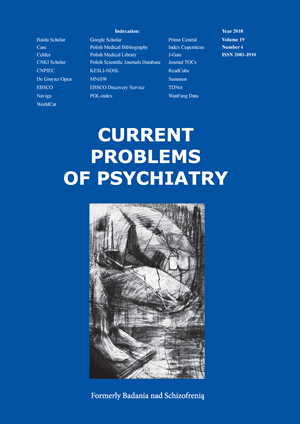Affective disorders in pregnancy and the postpartum period – from statistics to treatment. A synchronic approach
DOI:
https://doi.org/10.2478/cpp-2018-0020Keywords:
affective disorders, perinatal depression, pregnancyAbstract
The progress of medicine in the recent decades has strongly improved perinatal care, especially its somatic-related aspects. Pregnancy and childbirth have become much safer, but the mental strain and stress have remained the same. The models of motherhood and the number of children in a family have changed, giving rise to significant requirements concerning the quality of life of the offspring. These changes have brought about new psychological challenge for women and a team of psychiatrists and gynaecologists – obstetricians.
The aim of this study is to look at the affective disorders affecting women during pregnancy and postpartum: the postpartum depression and so-called baby blues, which were both compiled in the form of a table in the final part of this work to illustrate the differences between these two mental disorders.
References
1. Langan R, Goodbred A. Identification and Management of Peripartum Depression. Am Fam Physician 2016; 93(10):852-858.
2. Cox J. Postnatal mental disorder: towards ICD-11. World Psychiatry 2004; 3(2):96-97.
3. Institute for Quality and Efficiency in Health Care (IQWiG). Pregnancy and birth: Depression after childbirth – What can help? PubMed Health 2006.
4. Chandran M, Tharyan P, Muliyil J, Abraham S. Post-partum depression in a cohort of women from a rural area of Tamil Nadu, India. Br J Psychiatry 2002; 181(6):499-504.
5. Rai S, Pathak A, Sharma I. Postpartum psychiatric disorders: Early diagnosis and management. Indian Journal of Psychiatry 2015; 57(2):216-221.
6. Makara-Studzińska M, Morylowska-Topolska J, Sygit K, Sygit M, Goździewska M. Socio-demographical and psychosocial determinants of anxiety symptoms in a population of pregnant women in the regions of central and eastern Poland. Ann Agric Environ Med. 2013; 20(1):195-202.
7. Hanley J. Zaburzenia psychiczne w ciąży i połogu. Wrocław: Elsevier Urban & Partner; 2012
8. Penninx B, Milaneschi Y, Lamers F, Vogelzangs N. Understanding the somatic consequences of depression: biological mechanisms and the role of depression symptom profile. BMC Med. 2013; 11(129):1-14.
9. Seth S, Lewis AJ, Galbally M. Perinatal maternal depression and cortisol function in pregnancy and the postpartum period: a systematic literature review. BMC Pregnancy and Childbirth 2016; 16(124):1-19.
10. Murray L, Arteche A, Fearon P, Halligan S, Goodyer I, Cooper P. Postnatal Depression and the Development of Depression in Offspring Up to 16 Years of Age. J Am Acad Child Adolesc Psychiatry 2011; 50(5):460-470.
11. Biaggi A, Conroy S, Pawlby S, Pariante C. Identifying the women at risk of antenatal anxiety and depression: A systematic review. J Affect Disord. 2016; 191:62-77.
12. Meltzer-Brody S, Jones I. Optimizing the treatment of mood disorders in the perinatal period. Dialogues Clin Neurosci. 2015; 17(2):207-218.
13. Gamble J, Creedy D, Moyle W, Webster J, McAllister M, Dickson P. Effectiveness of a counseling intervention after traumatic childbirth. Birth. 2005; 32(1):11-19.
14. Scope A, Leaviss J, Kaltenthaler E, Parry G, Sutcliffe P, Bradburn M. Is group cognitive behaviour therapy for postnatal depression evidence-based practice? A systematic review. BMC Psychiatry 2013; 13(321):1-9.
15. Meltzer-Brody S. Treating Perinatal Depression: Risks and Stigma. Obstet Gynecol. 2014; 124(4):653-654.
Downloads
Published
Issue
Section
License
Copyright (c) 2018 Authors

This work is licensed under a Creative Commons Attribution-NonCommercial-NoDerivatives 3.0 Unported License.


